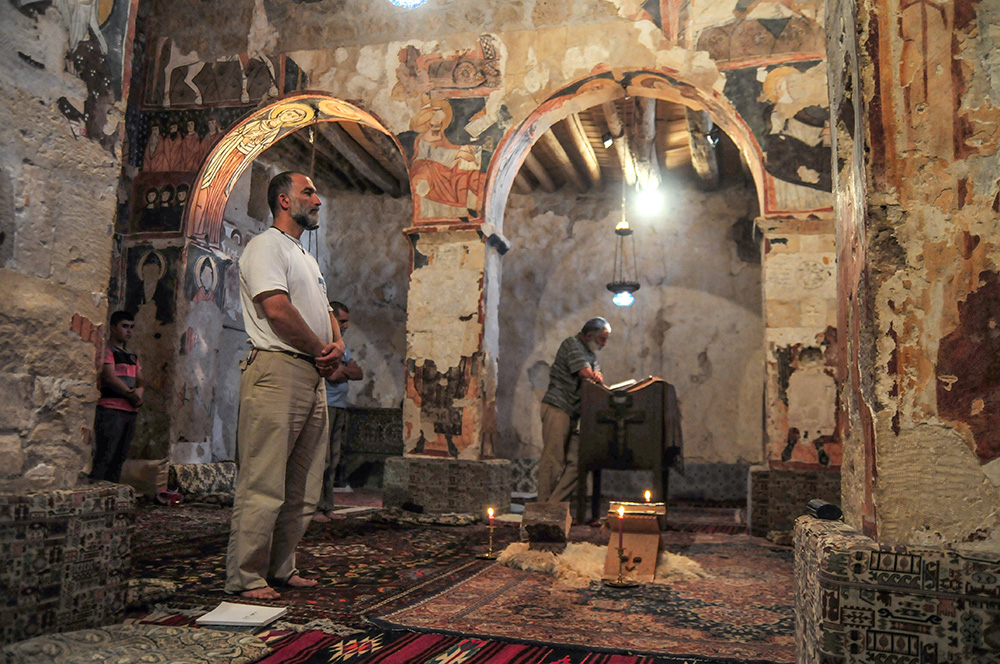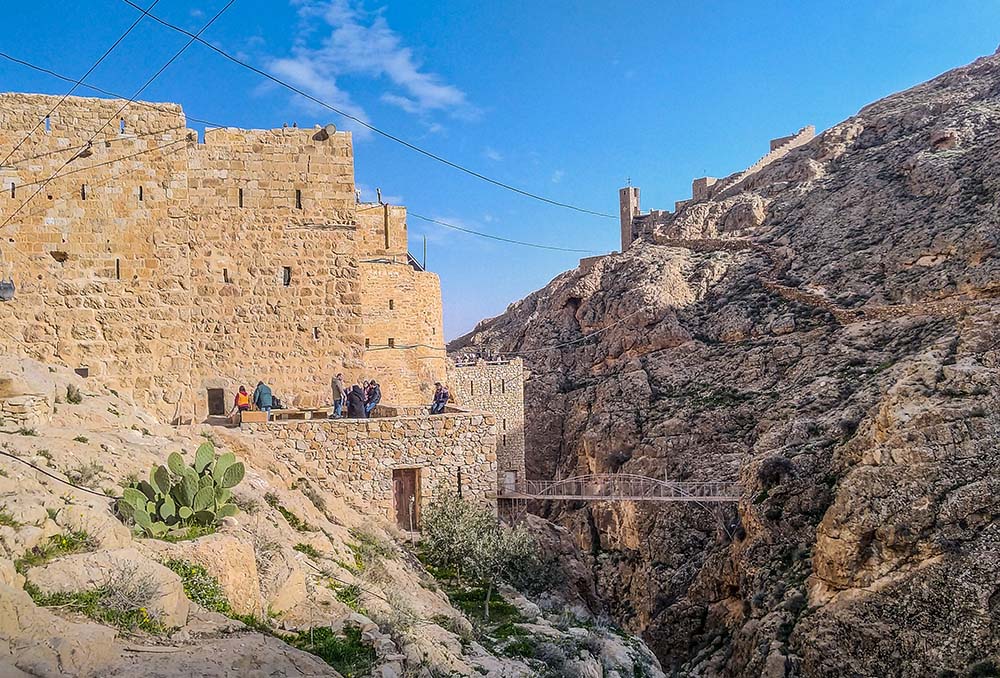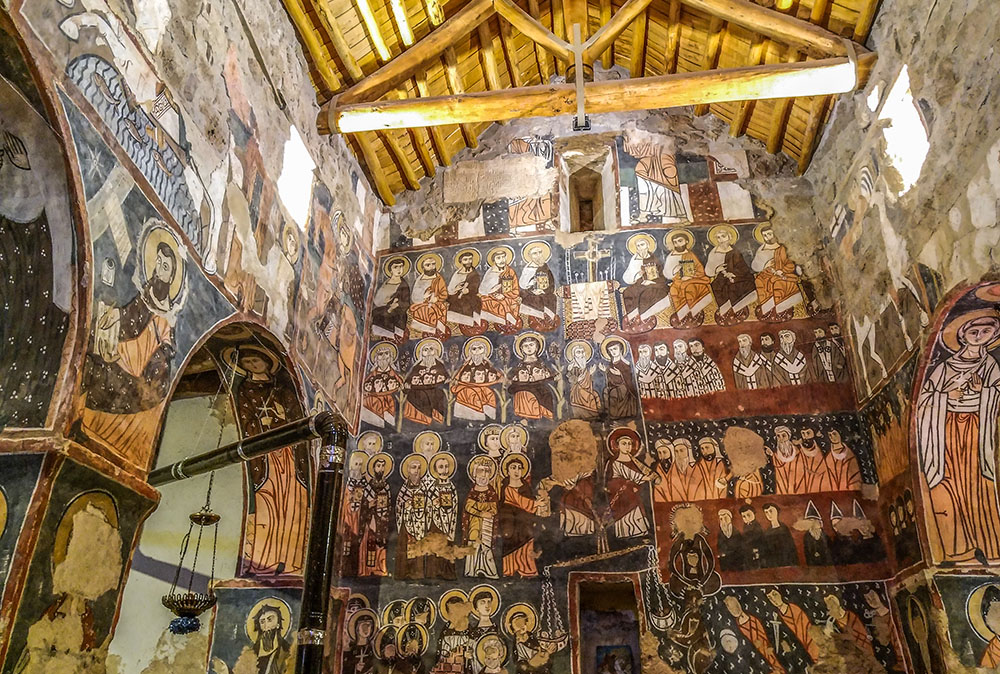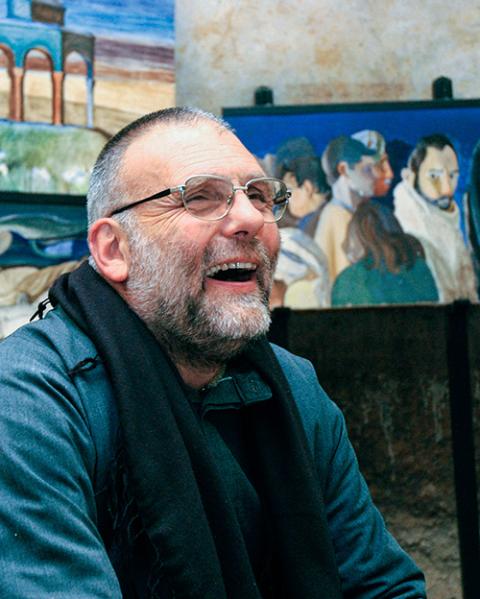
Syriac Catholic Fr. Jihad Youssef prays inside the church of Mar Musa Monastery in Syria in June 2017. Youssef became head of the monastic community in 2021. (Newscom/picture-alliance/dpa/Simon Kremer)
As Christian numbers continue to plummet in their ancestral Middle Eastern homelands due to conflict and dire economic circumstances, a community of monks and religious in Syria are developing a new way to be the "disciples of Jesus" to the Muslims in their midst, while nourishing Christian spirituality.
Syria's revitalized ancient Mar Musa Monastery, near the city of Nebek, has become a modern beacon of hope and resilience in a country marred by conflict, as its eight monks and sisters mainly of the Syriac Catholic rite, but also including some Orthodox and Protestants, refine Italian Jesuit Fr. Paolo Dall'Oglio's founding vision of reconciliation.
Syriac Catholic monk Fr. Jihad Youssef, who now heads the monastery, sees in the brokenness of the Syrian experience "a chance for changing the mentality," of the country's dwindling Christian population. According to Aid to the Church in Need, the number of Christians in Syria has dropped to 300,000, compared to pre-2011 civil war figures of 1.5 million. The conflict has killed half a million people, destroyed cities, and created political instability and economic turmoil.
"We have the chance to be real disciples of Jesus and a church amongst Islam, collaborating with Muslims, loving them, and willing to be with them," Youssef told NCR during a rare recent visit to the Jordanian capital, Amman.

A view of Mar Musa Monastery in Syria in 2019 (Wikimedia Commons/Tareq Mnadili)
The monastery's daily mission encourages a vibrant spiritual life and manual work — including fighting desertification near Nebek — all the while embracing Abrahamic hospitality with the local community of Muslims and Syriac Catholic, Orthodox and evangelical Christians in the town.
Also known as the Monastery of St. Moses the Abyssinian, it dates back possibly to the sixth century or earlier and is located some 50 miles (80 kilometers) in the mountainous desert area north of the Syrian capital, Damascus. Dall'Oglio and others re-established the monastery in 1991 after earlier restoration work.
Before the 2011 Syrian civil war, some 30,000 visitors came to the monastery, which hosts religious and spiritual tourism as well agritourism, but numbers are now much lower.
"Our hospitality is open to everyone: Christians, Muslims, Jews, families, groups, singles. But especially those who come to pray seeking discernment for their lives," Youssef said. "Those seeking their vocation and what to do have the priority."
But the 13-year war, COVID-19 and difficulties entering Syria have presented challenges to the monastic community since. The first was the kidnapping and disappearance of monastery founder and religious dialogue advocate Dall'Oglio in July 2013 by Islamic State militants in Raqqa, where he had gone to plead for the release of kidnapped activists. There has been no word of his whereabouts.
Two years afterward, in May 2015, monastery member Fr. Jacques Mourad was also kidnapped by Islamic State militants and came close to martyrdom, "but Jacques could flee after five months with the help of some Muslim friends and afterwards, he became our bishop," Youssef said. Mourad became the Syriac Catholic archbishop of Homs, Syria, in 2023.
Youssef underscored the importance of building bridges between religions. He noted that Mourad and the Mar Musa community have supported people suffering from the consequences of war with rebuilding projects and by providing psychological support and emergency humanitarian aid.
"In the first year of the war, we were isolated. It was dangerous. But we felt faithful to our vocation because the Lord invited us there. This had a big impact on the local population because they saw that we stood with them in solidarity. We did not leave them alone. Some workers from the city of Nebek came to live with us," Youssef explained.
But during the two-month Battle of Nebek between government forces and rebel groups in December 2013, the monastery community was again alone, and thankfully had food reserves.
Advertisement
After the fighting stopped, they could go to the city in early 2014 and tend to humanitarian needs by providing food, medicines and other basics. Later, they started a kindergarten and a school of music. The monks and religious also assist the poor with other medical needs thanks to mostly European and Christian donors.
"The people in our area are mainly Muslims, but in Nebek, we have Greek Catholics, Syriac Catholics, which is the rite of our monastery, and a very small evangelical community of three families. We work together," Youssef said.
"They pray together, do catechism together and music together. They make lots of things together. All activities also engage the Muslims, which for us is a beautiful testimony and witness of Christ's love," he explained. "These relationships of mutual understanding and good friendships have helped us a lot. This started before the war, and this was a big help during the war."
However, Youssef expresses concerns that many Syrians have for the future. Some will say that "the church in Syria is on its way to extinction," Youssef said.

The church of Mar Musa Monastery in Syria has frescoes that date to the 11th and 12th centuries. (Wikimedia Commons/Tareq Mnadili)
"The future is hard to predict because if the international political, economic and geopolitical situations are still like this, Christians will keep leaving the country," he said. "Also, Muslims are leaving. For us, as Christians, the result is disastrous because we are just disappearing."
But here is the challenge for this time, Youssef said, that the monastery community is embracing. "We are a mission. We don't only have a mission. But that means that our presence in Syria is meaningful to the kingdom of God. It's not by chance that we are there," he said of the Christian calling to serve in Syria.
"So, those who want to leave, leave and God bless them. But those who want to stay must think together how to be a church in this new context, in this new millennium."








